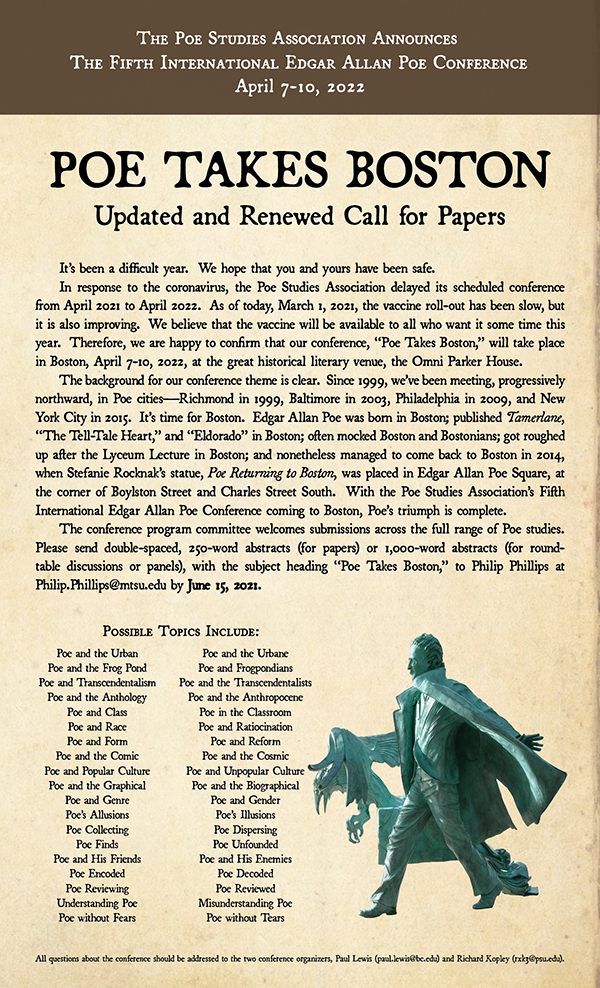Dracones in Mundo: Dragons in Literature, Film, and Pop Culture: A Series of Edited Volumes UPDATE/EXTENDED DEADLINE
Dracones in Mundo: Dragons in Literature, Film, and Pop Culture: A Series of Edited Volumes UPDATE/EXTENDED DEADLINE
deadline for submissions:
July 25, 2021
full name / name of organization:
St. Thomas University
contact email:
rachel.carazo@snhu.edu
I received a great response to the last call for papers regarding the volumes on dragons. As a result, I have been better able to refine and divide results.
Below are the new details for the updated call for papers:
As the popularity of mythical creatures in films and literature grows, there is one creature that remains prominent: the dragon. Dragons have become most visible recently in the cinematic versions of The Hobbit and in George R.R. Martin’s A Song of Ice and Fire (Game of Thrones Series). However, there are other films, such as Dragonslayer (1981), Reign of Fire (2002), Dragonheart (1996), and the How to Train Your Dragon series (2010-2019), and numerous adult and children’s literature series that feature dragons.
This call for papers will result in several themed volumes under each of these main headings:
---
FULL VOLUME(S)
1) Wings, Wonders, and Warriors: Dragons in Children’s Literature and Graphic Novels
--
SEMI-FULL VOLUMES (Needing 5-8 essays)
The following two volumes need a few more essays to be considered full:
2) Dragons in Mythology
*Working Title: Flights of the Imagination: Dragons in Mythology and Folklore
3) Dragons in Film and Television
*Working title: Heroes and Villains on 'Silver' Wings: Representations of Dragons in Film and Television
---
OPEN VOLUMES (Needing between 8-10 essays)
4) Dragons in Fiction* [due to the plethora of romance fiction with dragons/shapeshifters, I would be interested also in a separate study or at least a section of the volume about these romantic works]
5) Dragon Games and Online Culture [video games/card games etc]
6) Dragons, Posthumanism, and Animality [since the idea of the posthuman seeks to question the dominating humanistic and anthropocentric perspective upon the nonhuman world, these essays are meant to use this framework to highlight innovations or non-anthropocentric observations on dragons in literature, film, and pop culture]. Topics may include shapeshifters, corporality, affectivity, and the relationship(s) between humans and dragons.
7) The Landscapes of Dragons [these essays seek to investigate ways in which dragons are specifically tied to landscapes, images of the idyll, or images of devastation]
8) Dragons and Ecocriticism [these essays seek ways in which works with dragons remark on the environment in political and critical ways, or how dragon-related narrative can enhance valuable reflections in dialogue with current debates on ecology]
9) Dragon Riders: [even though there is a volume on general fiction, there is a specific genre built around dragon riders as well, so I encourage essays on these topics to show specific intersections between works and relationships within specific works on aspects of riding dragons]
10) Dragons in Fairy Tales/Dragons and Fairy Tale Tropes: [this volume seeks to find aspects of fairy tales or entire tales that relate to dragons/dragon lore in innovative ways/ the editor already has an essay (based on a fairy tale) related to Wings of Fire in process, but all other topics are currently open]
11) Dragons and Pop Culture: Music, Coats of Arms, Dragon Symbols, and Miscellany [this volume seeks to cover media and topics that do not easily fit into the other categories]
12) Dragons in Internet Memes: essays on memes from single films or other themes.
The scope of the present call is still broad. All topics regarding the themes and impact of dragons in film, literature, games, and online culture will be considered. Possible topics include (non-comprehensive list):
• Dragons as non-human animals
• Dragons and the environment
• Dragon symbolism
• The intersections of childhood, gender, race, and ethnicity with dragons
• Changes in the representations of dragons over time
• Visual aspects and attributes of dragons
• Representations of good and evil in connection with dragons
Deadline for proposals: July 25, 2021
Deadline for first drafts: September 25, 2021* [this deadline may be extended for volumes outside of the first depending on how many abstracts are received and which volumes are completed first]
How to submit your proposal
I will have a co-editor for three volumes: *Posthumanism, *Landscapes, and *Ecocriticism with Stefano Rozzoni (PhD Candidate, University of Bergamo), so proposals regarding those topics should be emailed to both rachel.carazo@snhu.edu and stefano.rozzoni@unibg.it
Please send all other abstracts, a short biographical note, and the name of the volume that the paper is for to Rachel L. Carazo at rachel.carazo@snhu.edu


